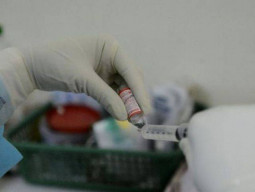
Medical experts say people should not be worried about the H1N1 influenza, also known as swine flu, as it will not be fatal for patients, if treated properly.
Recently, two people in Karachi tested positive for the virus and died - an infant and an elderly person. Health officials have also confirmed that 22 others have been diagnosed with the same influenza but they are out of danger and are not admitted at any hospital. The national health authorities have already put hospitals on alert after cases surfaced in different cities of Punjab, including Multan and Lahore.
"There is no need to panic about swine flu in the city," believes Dr Zafar Ejaz, the medical director of Karachi. He said that the health department has launched awareness sessions and isolation wards in major public hospitals have been established.
He explained that the physically weak, including children and aged persons, should get vaccinated immediately. "Patients with the flu must take plenty of water, rest and consult a doctor in case of severity," he advised. Otherwise, he added, there is nothing to worry about.
Prof Dr Khursheed Hashmi, a microbiologist at the Liaquat National Medical College's department of pathology, said that all kinds of flu, including swine flu and bird flu, have the same symptoms. "Even doctors can't judge the type of flu without a laboratory test," he maintained. A runny nose, fever, headache and cough are some early symptoms of swine flu, he said.
"People with flu should avoid social contact for a few days," Prof Hashmi advised. According to him, swine flu has spread to the country via the frequent global travelling of Pakistanis. "But it's not a threat," he said, adding that with proper rest and timely treatment, an affected person can recover.
Symptoms and treatment
Dr Naseem Salahuddin, an infectious diseases specialist at the Indus Hospital, said that swine flu bears many similarities with the common flu. "We have all experienced influenza. This is same," she explained. A runny nose, sore throat, cough, fever and body-ache are symptoms of the H1N1 influenza, she said, but in severe conditions there is a chance of diarrhoea.
"The cough continuous for three to five days and weakness is felt for around six days," Dr Salahuddin said. She urged infected persons to keep their fevers under control by using panadol tablets.
"No doctor can judge just by the symptoms whether a person has swine flu without a laboratory test," Prof Hashmi claimed. "It is like a common flu like condition."
Doctors advise that complete rest, which not only saves the infected persons but also their near and dear ones at home and at work. "One should avoid huge gatherings when suffering from the flu," said Prof Hashmi. "Children and elderly persons especially should be kept away from crowds," he urged, adding that a person suffering from the flu can infect others by sneezing, coughing or shaking their hands.
"With limited social contact, one saves others," Dr Salahuddin claimed. She urged the need to stay at home and rest but explained that when it is necessary to go out, infected people should avoid bodily contact with others and wear masks.
Vulnerable to virus
Doctors say that infants and elderly persons are easily infected by this virus. Smokers whose lungs are already affected suffer more. "The flu affects such persons and could be fatal," warned Dr Salahuddin. She claimed that people already in poor health from other diseases like heart failure or uncontrolled diabetes are likely to die if infected. "Around 90 per cent people infected with influenza recover," said the infectious disease specialist, adding that young people should not be worried about the flu. It is not necessary for someone with the flu to visit a laboratory for a test, said Dr Salahuddin. One can recover within a few days but should consult a doctor if the fever persists for more than that, she explained.
Published in The Express Tribune, February 6th, 2016.





































COMMENTS
Comments are moderated and generally will be posted if they are on-topic and not abusive.
For more information, please see our Comments FAQ